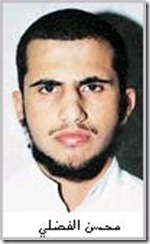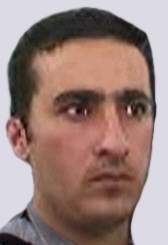
|
|
Muhsin al Fadhli, who is said to be al Qaeda’s new leader inside Iran. |
A notorious Kuwaiti terrorist named Muhsin al Fadhli has reportedly taken over leadership of al Qaeda’s network inside Iran. Sky News reports that al Fadhli assumed the top post in al Qaeda’s Iran franchise after Yasin al Suri, who has headed the network for years, was placed under “protective custody” following his exposure by US authorities.
In July 2011, the US Treasury Department designated al Suri and several other al Qaeda operatives who use Iranian soil to move funds and recruits from Gulf countries to Pakistan, Afghanistan, and elsewhere. The Treasury Department said that this network operates as part of a “secret deal” between al Qaeda and the Iranian government. In December 2011, US authorities announced that they were offering a $10 million reward for information leading to al Suri’s capture. [See LWJ reports, Treasury targets Iran’s ‘secret deal’ with al Qaeda and US offers $10 million reward for Iran-based al Qaeda financier.]
It was this increased scrutiny, according to intelligence sources cited by Sky News, that led to al Suri’s replacement.
Al Fadhli is an especially effective al Qaeda operative who was designated by the US Treasury Department in 2005. Al Fadhli “is considered an al Qaeda leader in the Gulf countries” and “fought alongside the Taliban and al Qaeda in Afghanistan where he served as a bodyguard and second-in-command for an al Qaeda leader,” the Treasury Department explained at the time. Al Fadhli “also fought against Russian forces in Chechnya, where he trained in the use of firearms, antiaircraft guns and explosives.”
Al Fadhli has long been an elite member of al Qaeda. In early September 2001, Treasury explained, he “possibly received forewarning that US interests would be struck.” The Sept. 11 operation was compartmentalized and only select members of the network received advance notice.
Among other nefarious activities, al Fadhli has been a key money man for al Qaeda. According to the Treasury Department’s press release in 2005, al Fadhli’s “support for terrorism extends to Iraq where he is believed to be providing support to fighters against US and multinational forces and is considered a major facilitator connected to the brutal terrorist, Abu Musab al Zarqawi.”
Al Fadhli even “requested that tapes be made showing evidence of successful attacks in Iraq” so that he could “solidify the support of key financial backers sponsoring attacks.”
Al Fadhli’s dossier does not end there. Even before he assisted al Qaeda in Iraq’s efforts, al Fadhli was involved in both the Oct. 6, 2002 attack on the French ship MV Limburg and the Oct. 8, 2002 attack against US Marines stationed on Kuwait’s Faylaka Island. One Marine was killed during the Faylaka Island shootout.
An al Qaeda operative named Muhammad al Hamati called al Fadhli “in the wake of the attack on the MV LIMBURG, informing him that the first operation on the French oil tanker had been completed,” according to the Treasury Department.
An al Qaeda cell responsible for the 2009 plot against Camp Arifjan, a US military installation in Kuwait, also had ties to al Fadhli. That cell was broken up by Kuwaiti authorities before it could launch an attack.
Al Fadhli was a leader of the so-called “Peninsula Lions Brigade,” a group of more than three dozen terrorists responsible for the Faylaka Island attack and other plots. He was tried in 2005, in absentia, along with other members of the brigade. In fact, al Fadhli has been tried, acquitted, and retried by Kuwaiti courts on various terrorism charges multiple times.
At one point, al Fadhli was sentenced to 10 years of hard labor in prison. In a separate case, according to a leaked State Department cable written in June 2005, al Fadhli was charged with involvement in al Qaeda’s October 2000 USS Cole bombing. That attack was carried out by the same network that bombed the MV Limburg, with help from al Fadhli, two years later.
Although al Fadhli has long been wanted for his al Qaeda role, it is unclear how many charges he was ultimately convicted of in Kuwait. One leaked State Department cable notes “the difficulties in prosecuting Kuwaiti terror financier Muhsin al Fadhli as an example of the dangers inherent in a lack of proper terror finance legislation” inside Kuwait.
Al Fadhli’s presence in Iran has long been known. The Arab Times reported in 2009 that Kuwaiti officials were interrogating an al Qaeda recruiter known as “MS” for his involvement in “luring … youths to fight Jihad against the foreign forces in Afghanistan.” The man known as MS reportedly told officials he had met with al Fadhli “several times” and that al Fadhli “lives along the Iran-Afghanistan border.”
In Kuwait, al Fadhli was closely tied to Sulaiman Abu Gaith, who served for a time as Osama bin Laden’s spokesman. Abu Gaith received safe haven inside Iran after the Sept. 11 attacks, but was placed under a loose form of house arrest in 2003. In 2010, the Iranians reportedly freed Abu Gaith from his lax confinement and he may have made his way to Pakistan. [See LWJ report, Osama bin Laden’s spokesman freed by Iran.]
Kuwaiti and US authorities are not the only ones interested in detaining al Fadhli. Saudi authorities have long targeted him as well. The man Sky News named as al Fadhli’s deputy inside Iran, Adel Radi Saker al Wahabi al Harbi, is among Saudi Arabia’s most wanted suspected terrorists.
No “specific” details of terrorist plotting
Sky News cited anonymous intelligence officials who believe a terrorist plot involving al Fadhli and al Qaeda’s network in Iran may be afoot. Al Qaeda’s emir, Ayman al Zawahiri, is reportedly interested in launching a mass casualty attack as retaliation for the killing of Osama bin Laden. However, the details of this putative plot are sketchy.
“We do know that an operation is under way. We assess that the most likely target is to be European. And the most obvious target in Europe for an attack that would attract a lot of attention would be the Olympic Games,” a source told Sky News. Iran is reportedly providing training in explosives, safe haven, and funding for the operatives involved.
A secret intelligence memo shown to Sky News reads: “Against the background of intensive co-operation over recent months between Iran and al Qaeda – with a view to conducting a joint attack against Western targets overseas… Iran has significantly stepped up its investment, maintenance and improvement of operational and intelligence ties with the al Qaeda leadership in Pakistan in recent months.”
The memo adds that al Fadhli’s deputy, al Harbi, “is considered an extremely dangerous field operative; he has fought in the Afghanistan and Pakistan theatres.”
The intelligence sources cited by Sky News explained, however, that they lacked “specific” intelligence on al Qaeda’s planning. It appears that the report is speculative when it comes to the details of the putative al Qaeda plot.
That said, Iran has provided safe haven to al Qaeda operatives known to be targeting the West. Members of an al Qaeda cell that was plotting Mumbai-style attacks on European cities are known to be currently living in Iran. [See LWJ report, Leaders of German al Qaeda cell living in Iran.]
Iran has provided assistance to al Qaeda in its operations before — not just in Iraq and Afghanistan, but also elsewhere. As the 9/11 Commission and US courts have previously found, al Qaeda’s 1998 embassy bombings in Kenya and Tanzania were modeled after Iran’s and Hezbollah’s operations in Lebanon in 1983 and 1984. While living in Sudan in the early 1990s, Osama bin Laden approached Iran and Hezbollah, asking for their assistance in executing attacks similar to the 1983 bombing of the US Marine Barracks which had led to the withdrawal of American forces from Lebanon.
Iran and Hezbollah agreed to help, providing training to al Qaeda operatives in camps in Lebanon and Iran. Among the trainees were al Qaeda members who would later plot the embassy bombings. [See LWJ report, DC court: Iran showed al Qaeda how to bomb embassies.]










6 Comments
Perfect target for a Tier 1 or CIA SAD assassination if things get hot with Iran. Iran needs to learn that there is a price for protecting Al Qaida terrorist leaders!
Vienna,February 16,2012
The points to watch out for investigation could be Thailand,
Malaysia and even India.If reports from Thailand are
correct the man who threw grenade at the taxi for not
taking him as passenger,which finally led to the amputation
of his own injured leg carries all marks of Al-Queda jihad.
He had associates on spot at the Thai capital and unlike a magnetic bomb used in New Delhi against the wagon of
Israeli Defense attache´s wife, the thailand group´s explosives were only sticky. Besides he carried grenade attack on the taxi. The terror scenes are diverse needing
a study in comparison.As the Long War is closing in on Pakistani theatre there is no way of loosening the grip. Memogate accounts show Inter Services Intelligence had indeed roped in the busy body businessman Ijaz for
trapping the Ambassador Haqqani.
Taravadu Taranga Truck for Media Monitoring TTTMM India
–Kulamarva Balakrishna
Considering the extreme and often murderous Shia/Sunni divide, I often question just how extensive this Iraninan Al-Qaeda link really is.
Someone like this is best left alone to engage the local & regional ‘communities.’ A guy like this will cause 10 to 100 times more damage than any of us could. Besides Israel the US doesn’t have any reliable or trustworthy partners in the region so the next best thing is to encourage & support chaos.
@Louie: The enemy of your enemy is your friend. The relationship is a marriage of convenience.
Nic, the enemy of your enemy is not necessarily your friend. Take Iran’s ally, Syria, for example. The U.S officials and General Martin Dempsey stated that al-Qaeda are fighting alongside opposition against Assad Regime. Do you think that Iran will stand by and allow al-Qaeda to overthrow their staunchest ally? I don’t think so. And let’s not forget the fact that Iran is battling Jundullah, a radical Sunni Islamist group with known ties to al-Qaeda.